As the role of artificial intelligence in daily life grows, its challenges and opportunities are front and center for experts and the public alike.
This chapter covers where experts and the American public differ in their excitement and worries, as well as where they think AI might surpass humans. It also walks through the areas of agreement, such as on government regulation, corporate responsibility, and concerns about AI bias and misinformation.
Concern and excitement over AI
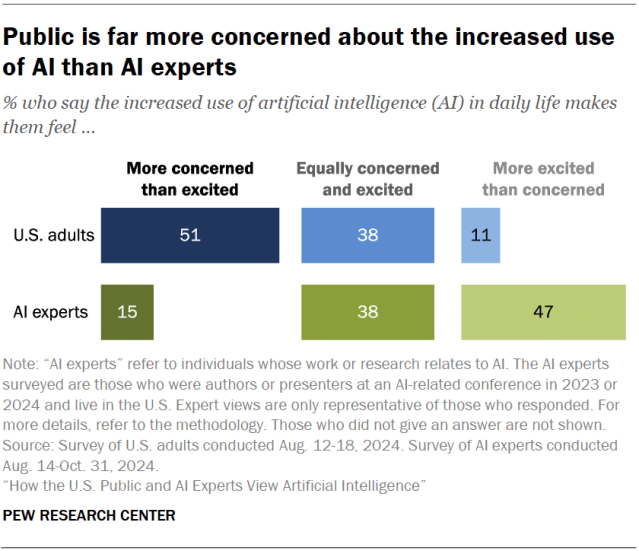
AI experts are far more enthusiastic than the American public about the increased use of AI in daily life. The public, on the other hand, expresses far more concern. Roughly half of the experts surveyed say they are more excited than concerned (47%) about the increased use of AI in daily life. By contrast, only 11% of U.S. adults say this.
About half of U.S. adults (51%) say they are more concerned than excited. This drops dramatically to 15% among the experts surveyed.
What’s more, the U.S. public has become more concerned over recent years. The share who say they are more concerned than excited increased from about four-in-ten in 2021 and 2022 to roughly half in 2023.
Today, identical shares of both groups say that they are equally concerned and excited (38% each).
By gender, among AI experts surveyed and U.S. adults
Among both the public and AI experts, men are more excited than women about the increased use of AI in daily life. The gender difference on excitement is wider among AI experts, though.
AI experts: A far greater share of men than women say they are more excited than concerned (53% vs. 30%). While just 11% of men say they’re more concerned than excited, that ticks up to 24% of women.
U.S. public: Men are again more likely than women to say they are more excited than concerned (15% vs. 7%). While 46% of men are more concerned, that rises slightly to 55% among women.
In in-depth interviews, we asked AI experts about what uses of AI excite them, and why. Some themes include making life easier or more efficient and improving outcomes for certain industries. (Quotes have been lightly edited for grammar and clarity.)
Quotes from AI experts: Reasons for excitement about AI
“I think broadly some of the things that excite me are things like applications that can save people a lot of time from repetitive and mundane tasks. So I think automating some of those workflows.”
“I’ve seen that the AI can improve a lot the accuracy of the diagnosis of different diseases. Also, it can boost the development of different medicines for different treatments. Like for instance, for breast cancer classification, it can improve a lot. It can decrease the false positive rates and false negative rates. Most excited about the positive impact that it could have in the health industry.”
And we also asked experts what uses of AI concern them, and why. Some themes include data privacy and misinformation.
Quotes from AI experts: Reasons for concern about AI
“I do think about how that [airport biometrics] technology is used, especially from a privacy and security standpoint. … Where’s that data going? How is it being housed? Where is it being used for? Where is my consent? Can I really, truly say no, I don’t want my picture taken, but what is the consequence of me saying that and still trying to make it to my flight at home?”
“Misinformation has always been an issue with technology. … But I think the main issue with AI and misinformation is that you can now do misinformation at scale, at a way larger scale.”
A 2021 Center survey found that some related themes also arose among U.S. adults when asked why they were either more concerned or more excited.
Specific concerns about AI
Our new survey also gives us the chance to compare expert and public concern in several key areas, including those related to “deepfakes,” misinformation, job displacement and AI bias.
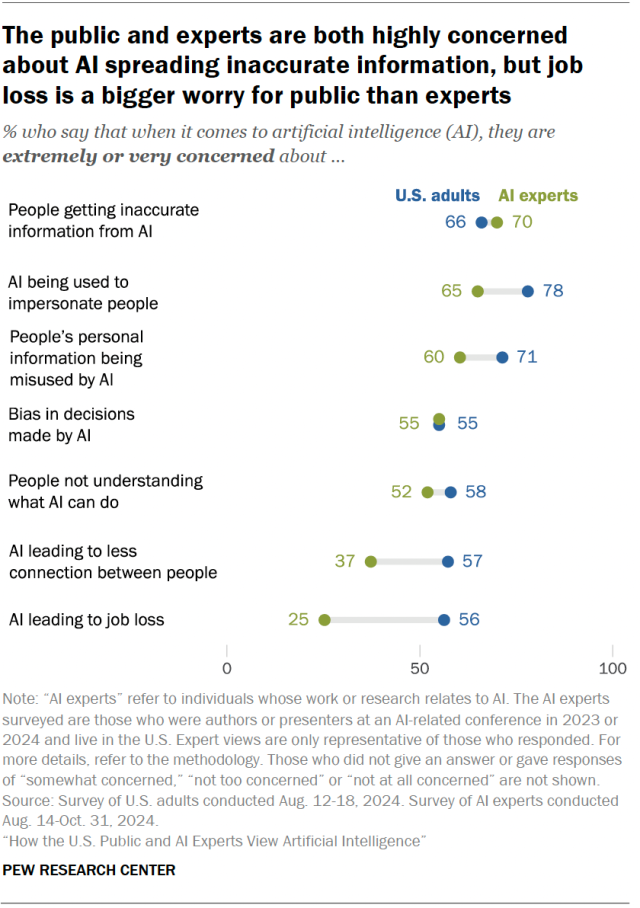
The public is more worried about losing jobs – and human connection – than AI experts. Continuing a theme from our broader body of research, we find the public is anxious about AI’s impact on work. More than half of U.S. adults are extremely or very concerned about AI eliminating jobs, versus a smaller share of experts surveyed (56% vs. 25%). The public also fears the loss of human connection more than experts do (57% vs. 37%).
There’s wide concern about inaccurate information. Seven-in-ten of the experts we surveyed and 66% of U.S. adults are highly worried about people getting inaccurate information from AI.
Impersonation and data misuse are also among the top concerns. The public is more worried about each of these things than experts – most U.S. adults are highly worried. Still, six-in-ten experts say they are extremely or very concerned about data misuse, and roughly two-thirds say this about AI being used to impersonate people.
Experts and the public align in their concerns about bias. Identical shares of each group (55%) are highly worried about this. About half or more of experts and the public also express notable concern about people not understanding what AI can do.
By gender, among AI experts surveyed and U.S. adults
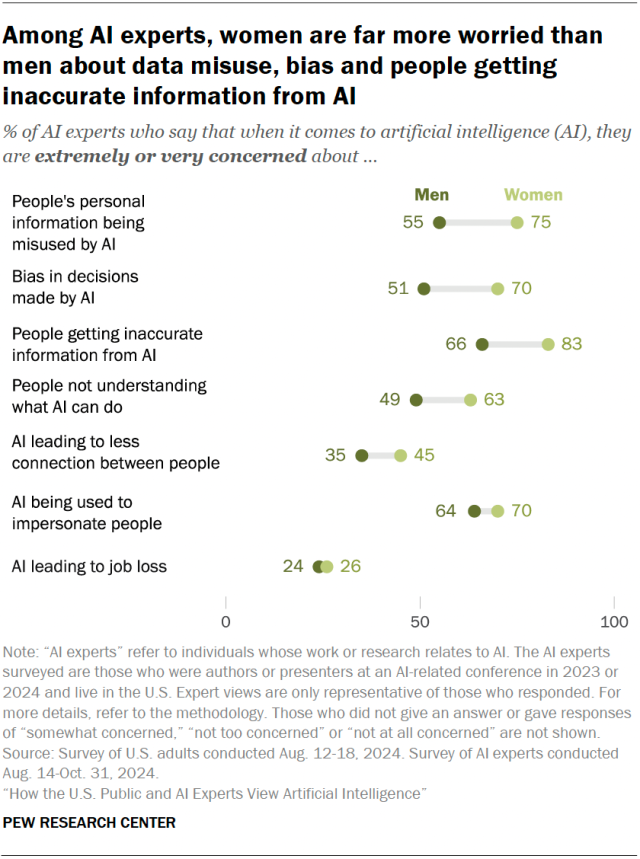
There are gender differences on specific concerns about AI as well. Some of the biggest are on data misuse, bias and inaccurate information.
On the other hand, women feel similarly to men about impersonation and job loss.
Among the general public, most gender differences on this topic are minimal.
Loss of human connection is one place we see women being somewhat more concerned in both groups, though. Women are slightly more likely than men to be highly worried about AI leading to this, both among experts (45% vs. 35%) and the public (63% vs. 52%).
AI’s personal impact
For some, concerns about AI extend to how they see their own futures.
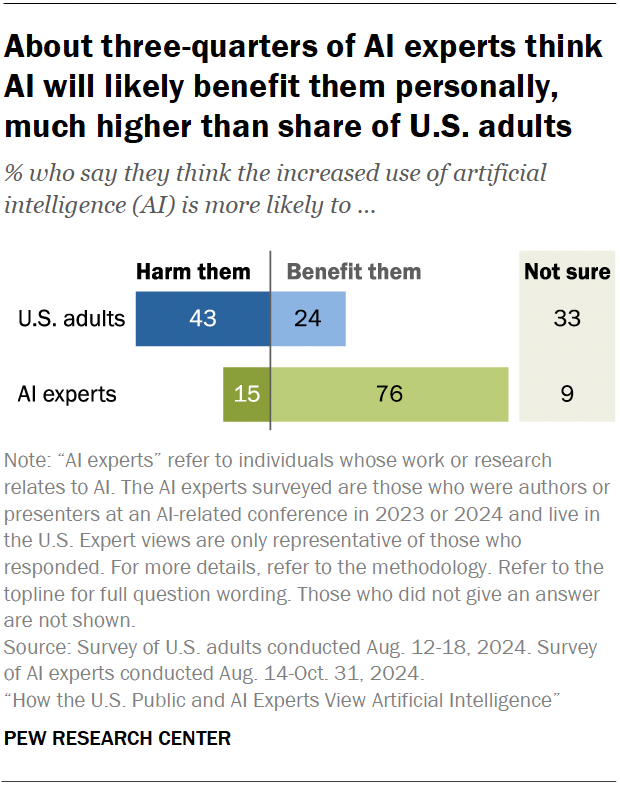
The public is more likely to foresee personal harm from AI than benefit, though there is notable uncertainty:
- 43% of U.S. adults say AI is more likely to harm them
- 24% say it’s more likely to benefit them
- 33% are unsure
In contrast, the AI experts we surveyed are widely optimistic:
- 76% of experts surveyed say AI is more likely to benefit them
- 15% say it’s more likely to harm them
- 9% are unsure
By gender, among U.S. adults and AI experts surveyed
Men stand out for thinking they’ll benefit from AI in both groups we surveyed.
Among U.S. adults, men are more likely to foresee personal benefit than women (31% vs. 18%). This gender difference is also present among the experts surveyed (81% vs. 64%).
Representation in AI design
Many of the conversations around harm in AI center around potential biases related to race, ethnicity and gender. These include examples from hiring algorithms to medical decision-making.
One way AI companies are dealing with potential racial and gender biases in their models is by improving how models are trained. At the same time, there are also calls for more diverse workforces to counteract bias. These efforts, though, have been met with pushback as companies scale back these initiatives.
We explored how the public and experts view the representation of six groups in this light, with questions we first asked in 2021.
How well are the views of racial and ethnic groups represented?
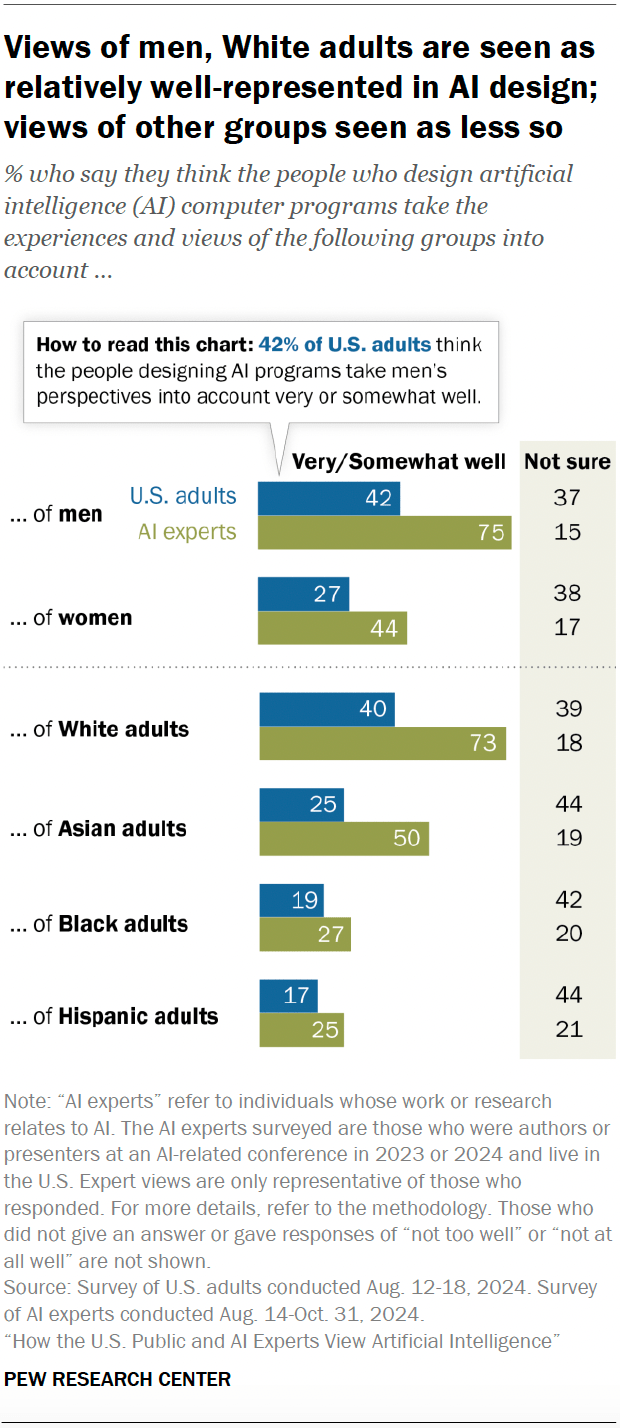
Both experts and the public believe White adults’ views are better-represented than other groups’ when it comes to AI design:
- 73% of experts we surveyed say the people designing AI take the experiences and views of White adults into account at least somewhat well.
- Half say the same for Asian adults and even smaller shares about Black (27%) or Hispanic (25%) adults.
The public is more uncertain than experts with roughly four-in-ten or more unsure about these issues. But the views of White adults’ representation again stand out:
- Four-in-ten U.S. adults say the perspectives of White adults are well-considered.
- Fewer say this about the views of Asian (25%), Black (19%) or Hispanic (17%) adults.
We saw similar patterns in which groups stand out as well-represented the last time we asked the public about their views on this in 2021.
By race and ethnicity, among U.S. adults and AI experts surveyed
Differences by race and ethnicity among the general public are mostly modest. Refer to Appendix B for how these views break down.
Among experts, there were not enough Black or Hispanic experts surveyed to be broken out into a separate analysis – reflecting the racial and ethnic makeup of the field as a whole. As always, these groups’ responses are incorporated into the general figures for experts’ views throughout this report.
How well are the views of men and women represented?
Considerable attention has been paid to women’s representation in the tech workforce – with many seeing them as underrepresented.
Both the public and the experts we surveyed see the views of women as less well-represented than men’s. Three-quarters of experts say the views of men are taken into account at least somewhat well by AI designers. In contrast, 44% say this about women’s views.
Again, the public is notably uncertain – about four-in-ten adults are unsure how well these views are accounted for. Still, they see men’s views as better accounted for than women’s (42% vs. 27%).
By gender, among AI experts surveyed and U.S. adults
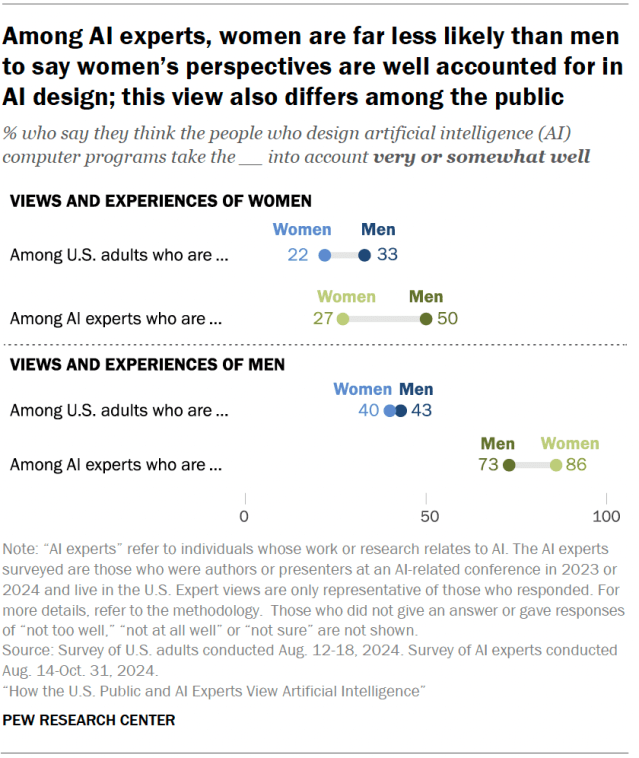
Women themselves are less optimistic than men when asked about the views of their own group.
- Among experts: 50% of men vs. 27% of women say the people who design AI take women’s perspectives into account very or somewhat well.
- Among the public: 33% of men vs. 22% of women say the same.
Among experts, women are somewhat more optimistic than men when asked about men’s views (86% vs. 73% say these views are well-represented in AI). But there are no gender differences in this view among the public.
Quotes from AI experts: Representation and bias
“I identify as a woman, female, and I belong to a minority community. And I definitely think we need more representation, not just in terms of gender, but also in terms of ethnicities, places where people come from.” – Asian expert
“I wanted [to use AI] to create an image of a Black family sitting around the table … Of course, there’s many different blends of African American, and very different blends of Black people, but I thought it was interesting that it generated a series of images where everyone was biracial. If you don’t know or if you can’t relate to what a Black family looks like, it’s only going to be amplified in the model that you’re creating, right? … Now, the interesting thing is it’s only a reflection of the biases that are in the people who are creating the information … we all have unconscious biases.” – Black expert
“Most of the data that these large-scale AI systems are trained on is scraped from the internet. And [that] data … is inherently biased, not only according to those social categories that you mentioned, gender and race and so on, but … generally it comes from wealthy Western countries, wealthy White countries, and in particular along the coastline of those countries. … So it’s a misconception that there is a malicious computer scientist embedding racism and sexism into the model. It’s completely unintentional. It’s essentially a product of ignorance of the data sources and the biases that are inherent in where we web-scrape the data from.” – White expert
AI versus humans
We also asked experts and the public to consider if AI could perform and even improve upon jobs traditionally done by humans. In a number of cases, experts are more optimistic.
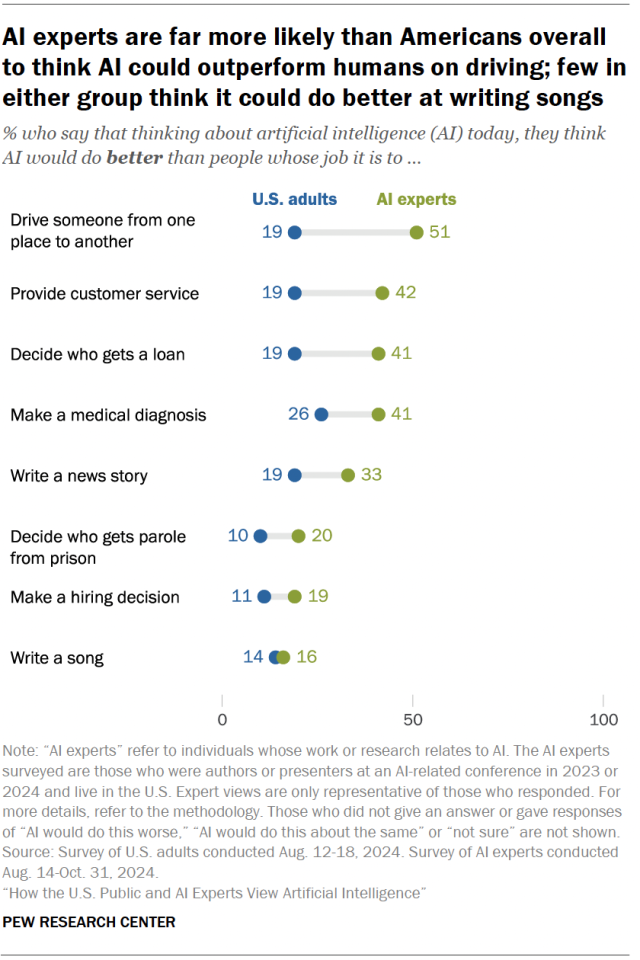
Experts are more likely than the public to say today’s AI could outperform humans on many tasks – like driving, customer service and loan decisions. For example, 51% of the experts we surveyed say AI would do a better job driving people around; 19% of the public say the same. (They could also say AI would do worse, about the same or that they weren’t sure.)
Few in the public think AI will outperform humans on any of the tasks we explored. The shares who say AI would do better than people whose job it is to do each task range from just 10% for parole decisions to 26% for medical diagnoses.
Both experts and the public doubt AI would best humans at certain tasks, including writing songs. Few among both the experts we surveyed (16%) and the general public (14%) think AI would do a better job in this case. Parole and hiring decisions are also among the tasks ranking low on this list.
Still, some of these views are mixed overall, even among the experts we surveyed. And the public is often more unsure than experts. For example, when asked about customer service, 16% of U.S. adults and 4% of experts say they’re not sure who would do a better job.
Regulation and responsible use of AI
Lawmakers are debating who should regulate AI – and to what extent. We explored several aspects of these debates in our surveys.
Government regulation
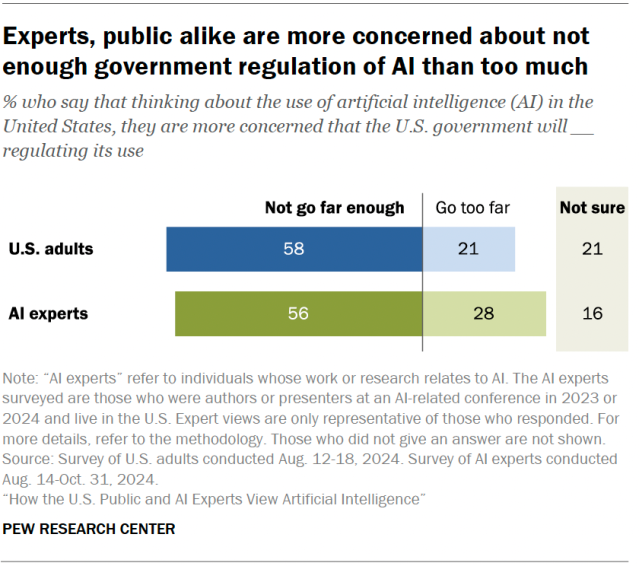
Experts and the public are more worried government regulation will be too lax: The public and experts surveyed both more commonly say they are concerned that the U.S. government will not go far enough in regulating AI, rather than going too far.
At the same time, 21% of experts and 16% of U.S. adults say they’re uncertain about this. (The surveys were fielded in summer and fall 2024, before the change in presidential administration.)
By political party, among U.S. adults
Majorities of U.S. adults in both parties are more concerned about insufficient regulation.
Still, Democrats (64%) are more likely than Republicans (55%) to say this. (Both groups include those who lean toward the respective party throughout this report.)
Confidence in government and industry
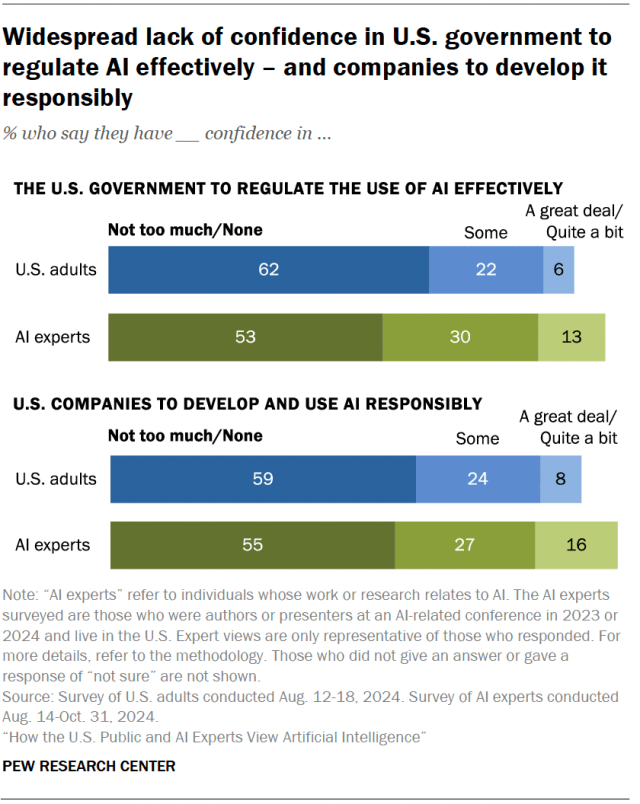
Experts and U.S. adults are largely worried about insufficient regulation. But they’re also not convinced that the U.S. government can make it happen.
There’s little confidence in the government to regulate AI effectively: 62% of the public and 53% of AI experts surveyed have not too much or no confidence in the U.S. government to regulate AI effectively.
There’s also widespread skepticism that U.S. companies will do their part: 59% of the public and 55% of AI experts surveyed similarly lack confidence in U.S. companies to develop and use AI responsibly.
By political party, among U.S. adults
Republicans are more likely than Democrats to lack confidence in the government to regulate AI effectively (70% vs. 54% have not much or no confidence).
But they’re just as likely as Democrats to say they have not too much or no confidence about companies responsibly developing and using AI (60% of Republicans and 59% of Democrats, including those leaning to each party).
By job sector, among AI experts surveyed
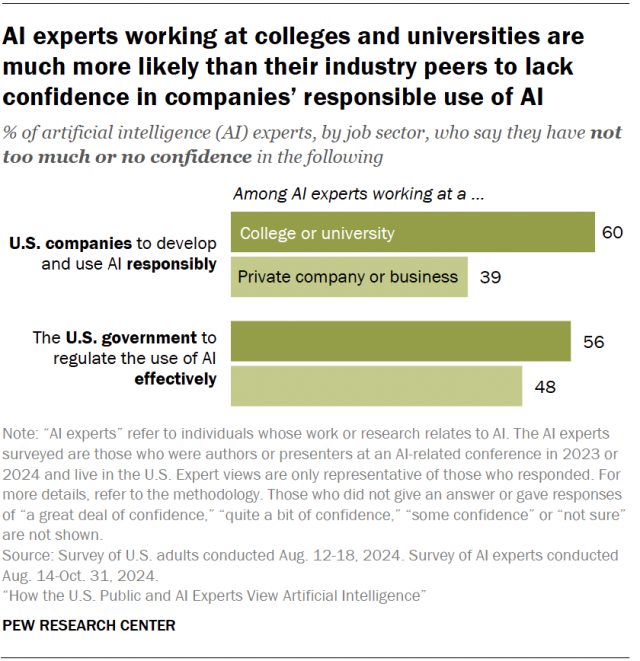
Confidence in companies also varies by where experts work:
- 60% of AI experts working at a college or university have not too much or no confidence in companies to develop and use AI responsibly.
- 39% of those working at private companies or businesses say the same.
By comparison, experts in these sectors hold similar views of the government’s ability to effectively regulate AI.
Quotes from AI experts: Regulation and responsible AI
“So I’m on both sides of this. I think we need to have limited regulations so that we can innovate and we can compete, because if we regulate too much, we’re going to be left behind … [but] for us not to have guardrails around [AI], to me, is wild.” – Expert working at a nonprofit
“[Companies] need to be transparent, and they need to include ways for people to either opt out or to correct anything that does not represent a person in their product.” – Expert working in government
